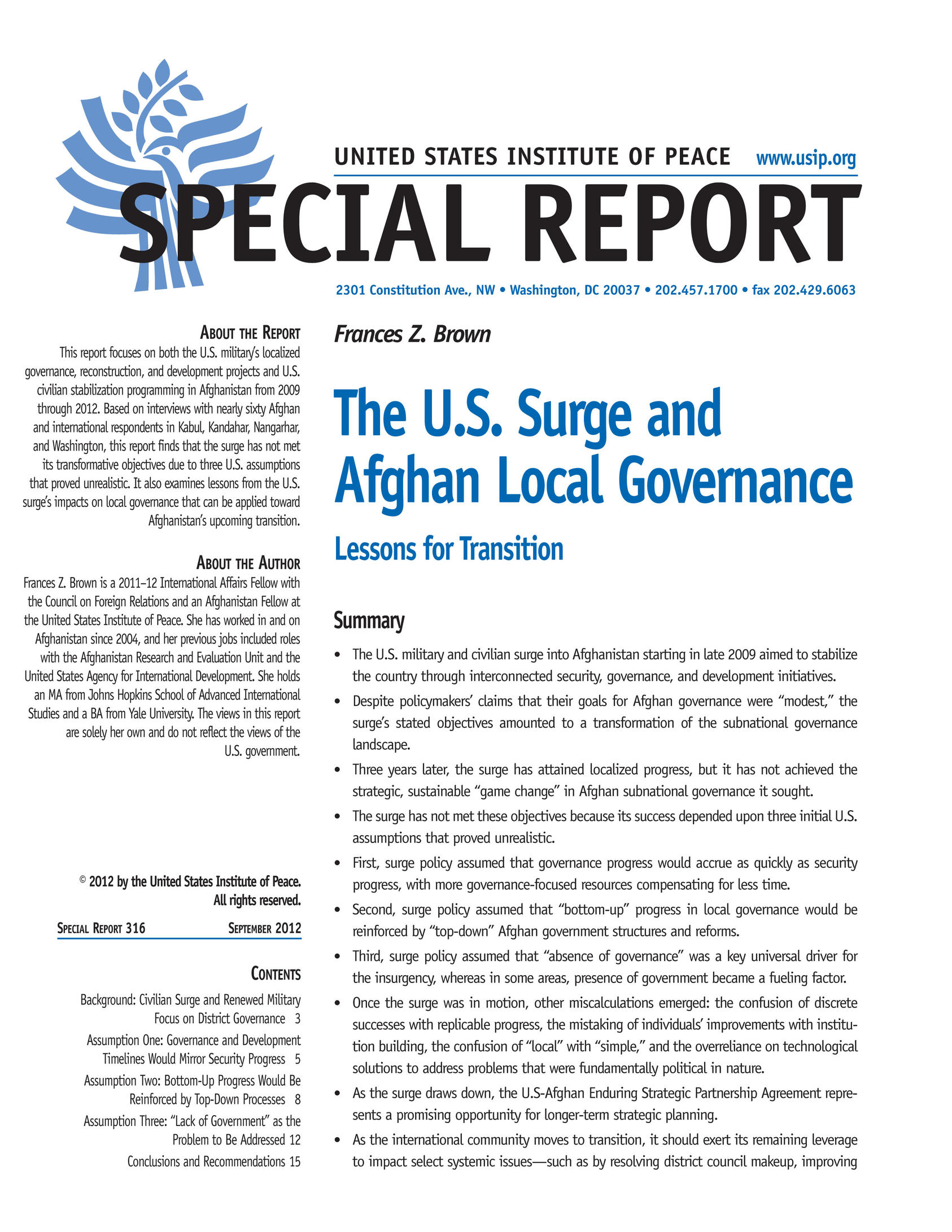The U.S. Surge and Afghan Local Governance
The U.S. civilian and military surge in Afghanistan aimed at transforming local governance, but it fell short because the strategy assumed that progress on security and governance would go hand in hand and that bottom-up progress would be reinforced by the national government. Going forward, the international community should focus on a few key governance issues to address and use the Strategic Partnership Agreement as a vehicle for long-term planning.

Summary
- The U.S. military and civilian surge into Afghanistan starting in late 2009 aimed to stabilize the country through interconnected security, governance, and development initiatives.
- Despite policymakers’ claims that their goals for Afghan governance were “modest,” the surge’s stated objectives amounted to a transformation of the subnational governance landscape.
- Three years later, the surge has attained localized progress, but it has not achieved the strategic, sustainable “game change” in Afghan subnational governance it sought.
- The surge has not met these objectives because its success depended upon three initial U.S. assumptions that proved unrealistic.
- First, surge policy assumed that governance progress would accrue as quickly as security progress, with more governance-focused resources compensating for less time.
- Second, surge policy assumed that “bottom-up” progress in local governance would be reinforced by “top-down” Afghan government structures and reforms.
- Third, surge policy assumed that “absence of governance” was a key universal driver for the insurgency, whereas in some areas, presence of government became a fueling factor.
- Once the surge was in motion, other miscalculations emerged: the confusion of discrete successes with replicable progress, the mistaking of individuals’ improvements with institution building, the confusion of “local” with “simple,” and the overreliance on technological solutions to address problems that were fundamentally political in nature.
- As the surge draws down, the U.S-Afghan Enduring Strategic Partnership Agreement represents a promising opportunity for longer-term strategic planning.
- As the international community moves to transition, it should exert its remaining leverage to impact select systemic issues—such as by resolving district council makeup, improving line ministries’ recurring services, and bolstering provincial administrations—rather than tactical-level ones.
- The international community should also prioritize a few key, attainable efforts, such as providing training that is consistent with current Afghan government functions, while avoiding creating additional structures.
- Finally, all the usual Afghan local governance recommendations still apply: resolving Afghanistan’s subnational challenges requires long-term commitment and systematic execution.
About the Report
This report focuses on both the U.S. military’s localized governance, reconstruction, and development projects and U.S. civilian stabilization programming in Afghanistan from 2009 through 2012. Based on interviews with nearly sixty Afghan and international respondents in Kabul, Kandahar, Nangarhar, and Washington, this report finds that the surge has not met its transformative objectives due to three U.S. assumptions that proved unrealistic. It also examines lessons from the U.S. surge’s impacts on local governance that can be applied toward Afghanistan’s upcoming transition.
About the Authors
Frances Z. Brown is a 2011–12 International Affairs Fellow with the Council on Foreign Relations and an Afghanistan Fellow at the United States Institute of Peace. She has worked in and on Afghanistan since 2004, and her previous jobs included roles with the Afghanistan Research and Evaluation Unit and the United States Agency for International Development. She holds an MA from Johns Hopkins School of Advanced International Studies and a BA from Yale University. The views in this report are solely her own and do not reflect the views of the U.S. government.



